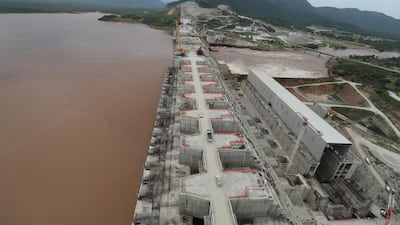Egyptian President Abdel Fattah El Sisi on Sunday said he hopes differences with Ethiopia over the reduction of his country's share of Nile water would be resolved when he talks with Prime Minister Abiy Ahmed in Russia.
Mr El Sisi did not give the exact date for the talks or say why the meeting is in Russia, but the two leaders are scheduled to attend a summit in the Black Sea resort of Sochi on October 23 and 24.
The two spoke on Friday when the Egyptian leader congratulated Mr Abiy on winning the Nobel Peace Prize.
The two leaders also discussed the progress of the drawn-out negotiations over the Grand Renaissance Dam, the filling of which will reduce Egypt's share of Nile water.
Cairo has said the talks reached a deadlock and that it wanted an outside party to mediate in the dispute, a demand rejected by the Ethiopians as premature.
The Ethiopian dam is built on the Blue Nile, which accounts for about 85 per cent of the Nile water, but only about 65 per cent of the water reaching Egypt.
The Blue Nile and the White Nile meet near Khartoum to become the Nile River, which flows downstream through the desert of northern Sudan and into Egypt, all the way into the Mediterranean Sea.
Egypt, with 100 million people, is the most populous Arab state. It is alarmed that the dam, due to start operating next year, will significantly reduce its share of water when a reservoir behind it is filled.
Mostly desert and depending on the river for most of its water needs, Egypt has publicly acknowledged the dam’s importance to Ethiopia’s development but argues that co-operation could reduce the expected damage to acceptable levels.
It wants the filling of the reservoir to be staggered over seven years.
Addis Ababa has agreed to a time of four to seven years, but it is also at odds with Cairo over how much water it should release at the time of prolonged drought.
Ethiopia considers the hydropower dam as essential to its development.
The dam has also become a symbol of national pride at a time when Ethiopians, like many in other Nile basin nations, feel Egypt has unjustifiably received most of the river’s water — an annual 55 billion cubic metres — for far too long.
“We will meet and, God willing, things will go in a way that allows us to resolve the problem one way or another,” Mr El Sisi said.
On Sunday he repeated his claim that the political turmoil and violence in Egypt after a 2011 popular uprising emboldened Ethiopia to build the dam without consulting Cairo.
“If it had not been for 2011 we would have had a solid agreement over the dam," Mr El Sisi said.
He said Egypt should be more careful "going forward".
He brought up the dispute with Ethiopia before the UN General Assembly last month. He said on Sunday that military action was not an option.
“Issues are resolved quietly and through dialogue,” Mr El Sisi said. “Egypt is not an aggressive nation and does not meddle in the internal affairs of others.
"When Egypt is at odds with other nations, it does not undertake negative action against them.”
He was responding to calls by some pro-government social media influencers that Egypt should resort to military action to resolve the dam dispute.
Mr El Sisi said his government was bringing in contingency plans to make up for any shortfall in its share of Nile water.
He said Egypt had built or was building desalination plants to meet the needs of communities on the Red Sea and Mediterranean coast. He also spoke of recycling water through treatment stations.
Egypt has spent 200 billion pounds (Dh45.1bn) so far on these projects and would spend another 100bn next year in a plan that extends to 2037, Mr El Sisi said.
“The amount of water available to us now is inadequate by international measurements. We have entered the stage of water poverty."


